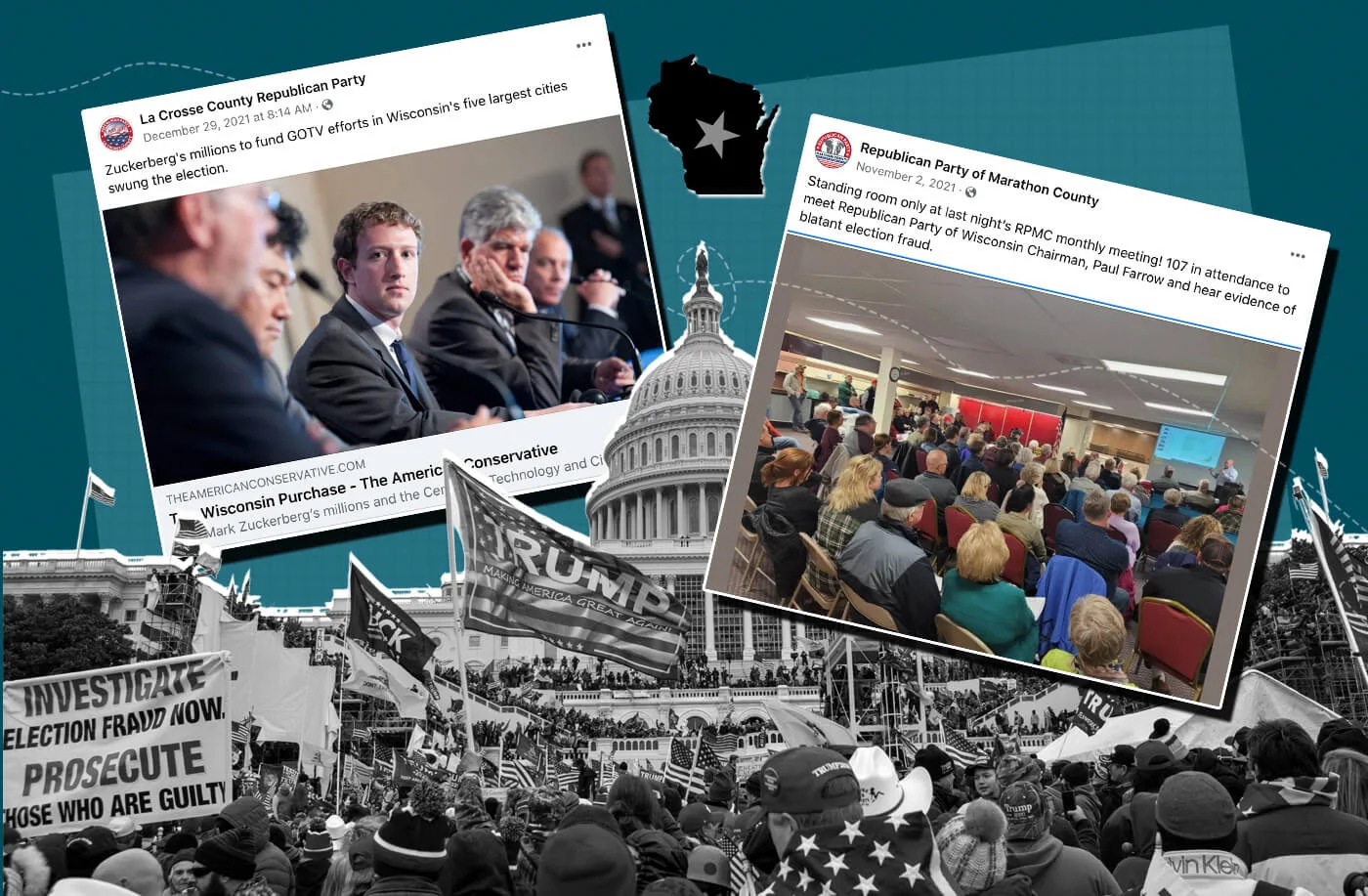
(Graphic by Morgaine Ford-Workman)
A year after the consequences were realized in the Jan. 6 insurrection, local political parties are still spreading lies on Facebook.
One year after the shocking storming of the US Capitol building by supporters of former President Donald Trump intent on halting the certification of Joe Biden as president, Republican Party members in counties across Wisconsin continue to discredit 2020 election results showing Biden as the victor in that race.
Posts casting doubts about the validity of that election’s results are commonplace on county Republican Party social media sites in much of the state. For instance, in Sawyer and Dunn counties, posts on the county Republican Facebook pages reference supposed cheating on vote totals to pad Democratic numbers.
Likewise, the Marathon County Republican Party page includes posts questioning the vote totals, and a Nov. 2 post lists more than 100 people attending a meeting to “hear evidence of blatant election fraud.”
Posts for the La Crosse County Republican Party also cast doubts on election results, including a Dec. 29 post stating “Zuckerberg’s millions to fund [get out the vote] efforts in Wisconsin’s five largest cities swung the election,” followed by a link to a story by the American Conservative, a right-wing publication, describing how big money favoring Democrats supposedly swung the election in Biden’s favor.
Republicans frequently cite grants from the Center for Tech and Civic Life—an organization funded by Facebook founder Mark Zuckerberg but separate from the company—without noting around 200 other Wisconsin municipalities of various political makeups also received grants.

RELATED: WI GOP Marks Jan. 6 Insurrection Anniversary With Conspiracies and Concerns for Rioters
Rather than disappear in the wake of the attack on the Capitol building, such posts seem to have become increasingly commonplace among Wisconsin’s Republican Party leaders, according to a review of county Republican Party social media and websites.
Election officials and others said they worry continued misinformation about election results–despite no evidence of significant voter fraud that would have resulted in Trump winning–are fueling an anti-government movement that could cast doubts about future elections and place American democracy at risk.
“This is extremely troubling in the long run for our democracy. It undermines faith in our elections, and that is dangerous,” said Geoff Peterson, chair of the UW-Eau Claire political science and American Indian studies programs.
Social media posts by conservatives surfaced last year after the election, when Trump falsely claimed the election was rigged against him—a claim he was making even before any votes were cast. In St. Croix County, the county Republican Party Facebook page was taken down for a time about a week after the insurrection when then-county party Chairman John Kraft, apparently without the consent of his colleagues, made posts advocating followers to “prepare for war” if the election results weren’t overturned.
Certified results show Biden won the election with 306 Electoral College votes, compared to 232 for Trump. A total of 270 of those votes were required to be named president. Biden carried Wisconsin by about 20,000 votes. Recounts in Wisconsin and elsewhere in the US have shown no widespread voter fraud that would have substantially changed election results.
Raising Doubts
Disbelief of 2020 voting results, fueled by Trump himself, sparked the attack on the Capitol that resulted in the deaths of five police people and injuries to about 140 officers. Since then, a significant number of Wisconsinites and other Americans have expressed doubts about 2020 election results.
Those doubts have been prompted and furthered as many Republican lawmakers and other party leaders nationally and in Wisconsin repeatedly question the election’s outcome, despite offering no evidence of widespread voter fraud, Peterson said. Chief among them is Republican US Sen. Ron Johnson of Wisconsin, who has repeatedly questioned election results and in November told state Republican legislators they should take control of administering federal elections in Wisconsin.
On Nov. 7, 2020, three days after the election, Assembly Speaker Robin Vos (R-Rochester) ordered an investigation into voting irregularities despite little evidence they occurred. In February Republican lawmakers ordered a nonpartisan audit that showed no widespread fraud.

Nonetheless, some Republicans continue repeated claims of election fraud, prompting the introduction of bills in the state Legislature intended to restrict voting access. Vos hired former conservative state Supreme Court Justice Michael Gableman, who falsely claimed the election was stolen from Trump, and he continues his investigation without evidence the voting process was tainted.
On Thursday, the one-year anniversary of the attack on the Capitol, Democratic politicians and others spoke about the danger the continued dismissal of 2020 election results poses to democracy in America. In an address to the Senate, Wisconsin US Sen. Tammy Baldwin criticized Republican lawmakers in Wisconsin for furthering election doubts that “undermine our democratic process.”
“The Big Lie hasn’t gone away,” she said.
Speakers at an event in Milwaukee to mark the Jan. 6 insurrection expressed similar concerns, saying actions such as Wisconsin’s gerrymandered election maps, more strict voter identification laws, and limiting the number of drop boxes are hindering voter access in the state.
Claims about fraudulent voting have been around for as long as elections have taken place, Peterson said. He referenced concerns about votes being wrongly added to President John F. Kennedy’s total in 1960, or claims that George W. Bush won the 2000 presidential race over Al Gore because of voter fraud as examples of people unhappy with those results questioning the process.
But those concerns dissipated fairly quickly, Peterson said, and were held by a far smaller number of people than seem to accept untrue claims that the 2020 election results were tampered with.
“The difference we’re seeing this time around is there seems to be more acceptance of this conspiratorial thinking by [Republican] Party leaders,” Peterson said. “The people who traditionally have represented the institutions of the party, who in the past have accepted the election process, they’re not doing that this time.”
The availability of social media is also responsible for the prevalent spread of misinformation about the election, Peterson said. In previous times it was more difficult for people with those concerns to connect with others; now a message sowing doubts can be spread to tens of thousands of people in a matter of minutes.
“Social media makes it possible to amplify those messages without the ability to balance that information,” he said. “That makes it more of a potential threat … I’m not sure yet what the answer to this is, but I fear that we may see more of this and flounder for a bit before we get to a better place.”
Politics

It’s official: Your boss has to give you time off to recover from childbirth or get an abortion
Originally published by The 19th In what could be a groundbreaking shift in American workplaces, most employees across the country will now have...

Trump says he’s pro-worker. His record says otherwise.
During his time on the campaign trail, Donald Trump has sought to refashion his record and image as being a pro-worker candidate—one that wants to...
Local News

Stop and smell these native Wisconsin flowers this Earth Day
Spring has sprung — and here in Wisconsin, the signs are everywhere! From warmer weather and longer days to birds returning to your backyard trees....

Your guide to the 2024 Blue Ox Music Festival in Eau Claire
Eau Claire and art go hand in hand. The city is home to a multitude of sculptures, murals, and music events — including several annual showcases,...



